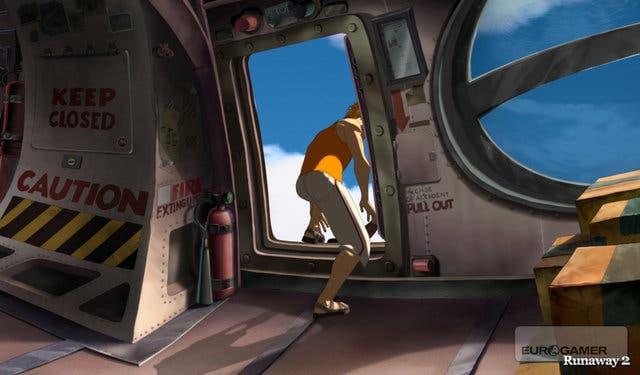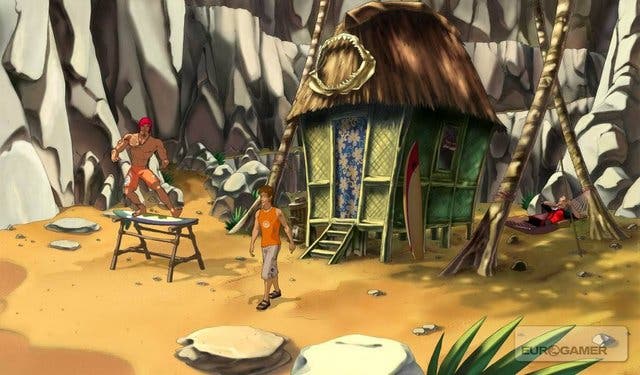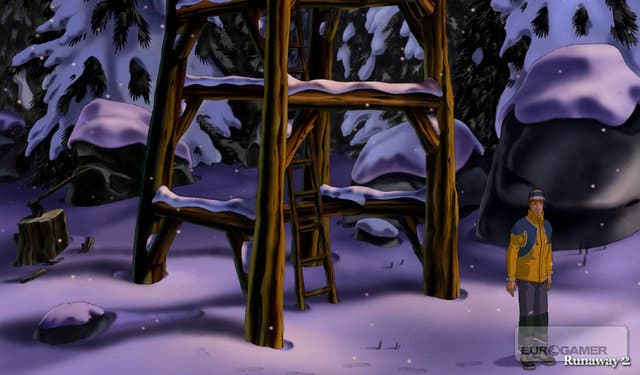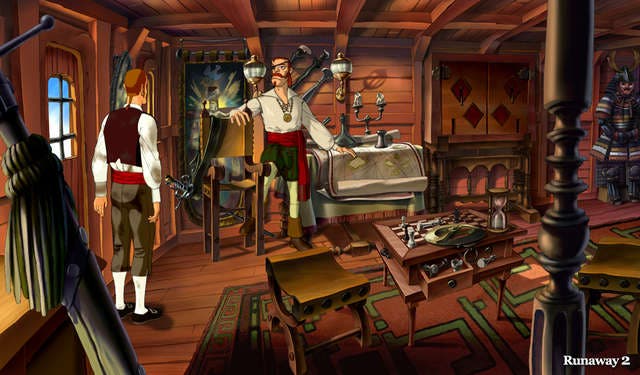Runaway: The Dream of the Turtle
Flee circus.
A rather belated follow up to the highly praised 2003 point-and-clicker, Runaway: A Road Adventure, the unfortunately titled Dream of the Turtle flies in the face of gaming convention by changing pretty much everything from the original. For those who missed it, the original Runaway told the story of Brian Brasco, a geeky New York college student who crosses paths with Gina, a mysterious woman being pursued by the Mafia. As the title suggests, they had to run away. It was pretty good, all things considered.
We rejoin our heroes as they vacation in Hawaii, until a mishap during a sightseeing flight forces Gina to bail out over an island. Crash landing in the jungle, Brian sets about finding her - a task which soon expands to include a larger plot involving the obligatory mysterious military men, scientists and civilians who'll only help you out after you've carried out a string of errands. Oh, and there's an alcoholic lemur. Trust me, this is important.
In keeping with the more laidback location, Brian has received a makeover - his spectacles and shirt have been replaced with a shaggy dude hairdo and skate-chic clothing. The storyline - which revolves around ancient relics and military skulduggery - is almost entirely separate from the original, and the cast members that return do so in a way that doesn't require any prior knowledge. Fans of the previous game may find themselves put off by the almost total switch in tone, but should newcomers feel a burning need to find out what happened previously, there's a handy animation accessible from the menu that recaps the events of the first game. Playing catch-up simply isn't a problem.
Brian's brain

And that's a relief since, if any game represents the cream of the current old school adventure crop, it's this one. Those frustrated by the point-and-click interface in the past may find their grumbles alleviated slightly by Runaway's intelligent context-sensitive progress. Brian is more like your partner in the game than an unthinking avatar. Traditionally, adventure games required you to walk through every step of every action, to often obscure and tedious effect. Here, if you're on the right track, Brian is smart enough to fill in the blanks. For instance, early on you find some goggles lying in quicksand. Brian can't reach them, but once you make it clear that you'd like him to get them, he finds a branch all by himself and fishes them out. Not long after, having crafted a rudimentary catapult, Brian simply kneels down and supplies his own ammunition.

Once upon a time, developers would have squeezed a few more minutes of rote gameplay out of the search for suitable branches or stones. Runaway 2 is wise enough to realise that, in a jungle, searching for such things is a pointless task and modern gamers want to be able to get on with playing, free from such mindless chores. It's certainly a far cry from the days of LOOK AT ROPE, GET ROPE, USE ROPE, I CANNOT USE ROPE and I, for one, couldn't be happier to see such clunkiness banished to the dustbin of history.
That's not to say the game is completely free of peculiarities, or moments where progress only comes accidentally from trying every item in your inventory. Most notably, vital locations and items are sometimes obscured by the detailed backgrounds, requiring you to fall back on the old systematic mouse-sweep of each location. Even then, I found myself flummoxed on several occasions, only to discover the obvious solution by scrolling the screen a few pixels to the side. Once you learn to accommodate this hiccup, the puzzles in question are almost always logical, with items being put to realistic uses. There are thankfully few "how was I supposed to know that?" moments, where hours of frustration stem from not realising you can combine a watermelon, paper clip and suntan cream to make a crash helmet.
Tower of babble

Attractively presented and wittily written, it's a rare treat to find an adventure game that spends at least as much time amusing you with its animation and dialogue as it does baffling you with puzzles. While the characters are a pleasing mixture of anti-aliased cel-shaded cartoon and well-observed realistic animation, the visuals on the whole have an endearing hand-drawn quality. The only moments where the presentation wobbles is during close-up dialogue scenes. The facial animations are noticeably clumsier, their limited frames and simplistic expressions looking more like the sort of thing you'd find on the average Flash game at Newgrounds. Conversations can be long-winded and distracting as well, with essential information buried deep within multiple responses and pointless prattle. Adventure games are more sedately paced by nature, but sitting through rambling dialogue trees wondering if you should be taking notes isn't my idea of fun.

While the script occasionally overreaches itself in the quest to be funny (can we please have a moratorium on videogame characters making post-modern references to being in a videogame?) the voice acting generally lifts it over the lumpy bits. Brian, in particular, is well acted and the genial delivery makes him an easy hero to root for. Indeed, he actually sounds suspiciously like Owen Wilson, the butterscotch stallion himself. Some of the vocals supplied by the supporting cast are less easy on the ears - there's an awful Australian surfer, and a Japanese character from the first game whose "me so velly solly" accent is acutely embarrassing - but overall the result is a vibrant and charming game world that positively invites exploration.
Though it occasionally feels a touch too stylistically beholden to the Golden Age of Lucasarts adventures, that fact is more likely to entice ardent point-and-clickers than turn them off. The absence of any truly teeth-gnashing puzzles means that experienced players will rattle through this tropical romp in short order, but the experience will at least be an overwhelmingly enjoyable one.








